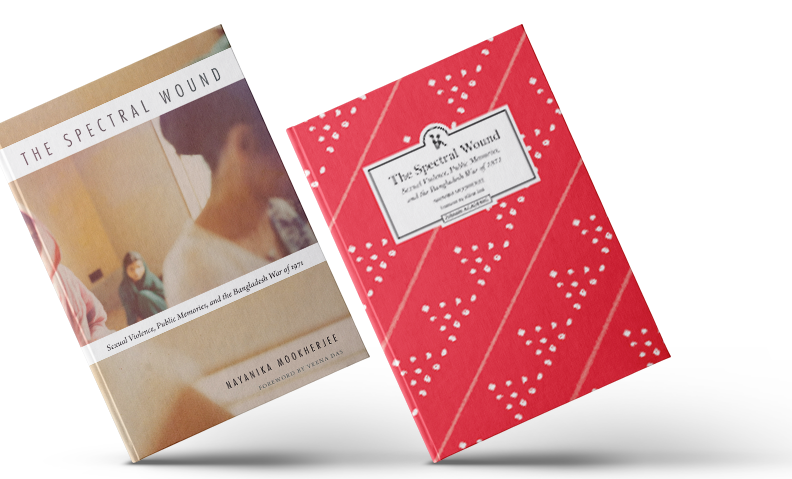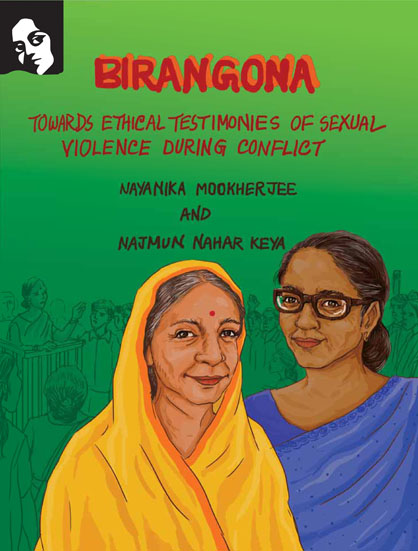Main

THE SPECTRAL WOUND
The source of these guidelines, graphic novel and animation film (both in Bangla and English) are the research findings from Professor Nayanika Mookherjee’s book The Spectral Wound: Sexual Violence, Public Memories and the Bangladesh War of 1971. Durham: Duke University Press (2015); Delhi: Zubaan Books (2016)
The Bangladesh war of 1971 is particularly significant as in the post-war period the Bangladeshi state publicly honoured the women raped during the war as the ‘birangona’ (brave woman). There has also existed for the last 47 years a public memory (not silence) of wartime sexual violence that is hardly known beyond Bangladesh.

Why is there a need for these Ethical Guidelines, Graphic Novel and Animation Film?
Professor Nayanika Mookherjee’s research studies the public memories of sexual violence during the Bangladesh war of 1971. She does so by ethnographically examining the testimonies of survivors, state officials, human rights activists as well as archival sources, visual and literary representations.
Context
The emergence of East and West Pakistan in 1947 was a consequence of the partition of the eastern and northwestern parts of colonized British India with the objective to create Muslim homelands. In the formation of Pakistan, however, the idea of a Muslim homeland was one of the main principles of nationhood among others unifying two widely disparate units, separated not only geographically but by sharp cultural and linguistic differences. Over the years, various West Pakistani administrative, military, linguistic, civil, and economic control over East Pakistan resulted in the nine-month long war in 1971, and ultimately in the formation of Bangladesh. At the end of this struggle Bangladesh was faced with the staggering number of 3 million dead and 200,000 women (official numbers) raped by the Pakistani army and Razakars (local Bengali collaborators).
After the war, the Bangladeshi government in a globally unprecedented move till date referred to the women raped during the war as birangonas (‘war heroines’) to prevent them from being socially ostracized, and attempted to rehabilitate them by enabling abortion for the women and adoption of ‘war babies’ to western countries as well as marrying the women off or giving them jobs. So there was no silence about wartime rape of the 1971 war unlike other instances of sexual violence during wars. Instead, in Bangladesh, there is a public memory of wartime rape and since the 1990s various testimonies of birangonas have been recorded. Since 2015, the Government of Bangladesh has started giving pensions to birangonas. Most of the research in this area focuses on highlighting the testimonies of violence only.
Most of the research in this area focuses on highlighting the testimonies of violence only. Interviews with survivors however show that with the focus on documentation of the experiences of wartime rape,
Interviews with survivors show that with the focus on documentation of the experiences of wartime rape,
(i) Inadequate attention is paid to the conditions under which such testimonies are recorded.
(ii) As a result, ethical practices of documentation can be flouted by journalists, human rights activists, government officials, NGO personnel, researchers in their pursuit of recording wartime rape.
(iii) Hence, survivors can experience a double set of transgression in the very process of testifying to their violent experiences during wars.
(iv) Hence, there can emerge a critical disconnect between survivors needs and transitional justice processes. Keeping these sensitive and ethical concerns in mind this website wants to focus on those who record testimonies of wartime rape (researchers, human rights activists, feminists, lawyers, filmmakers, photographers, journalists, writers).
We have co-produced in collaboration with Research Initiatives Bangladesh (RIB) a survivor-led ethical guidelines, a graphic novel and an animation film through a historically and archivally informed, intergenerational family story.
These tools can be can be used by those who record testimonies of sexual violence in conflict (researchers, human rights activists, feminists, lawyers, filmmakers, photographers, journalists, writers). The guideline was launched in August 2018 by the Ministry of Liberation War of the Government of Bangladesh.
This is a work of fiction based on historical facts and any distortions are unintentional..
The Project is funded by the ESRC Impact Acceleration Account and Durham University’s Research Impact Fund.



